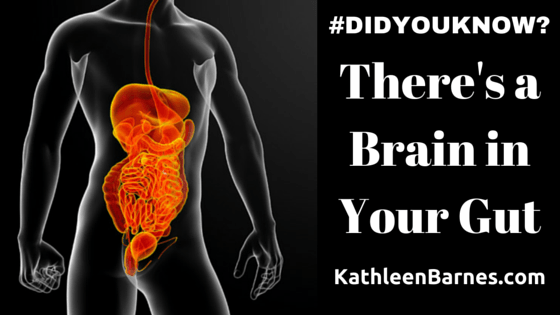OK—this may be a stretch for you, but it’s not really.
Yes, there is a brain in your gut. The gut — the digestive system — has sometime been called the “second brain.”
In fact, there are 100 million neurons in your digestive tract. Those nerve cells transmit messages to the brain and have a profound effect on your health. They are yet another confirmation of the synchronicity and interdependence of all parts of our bodies.
No, these neurons do not transmit thoughts or participate in decision making. They are primarily focused on digesting food, directing the utilization of nutrients and eliminating the waste products of digestion.
They also have a profound effect on our emotions, primarily because the gut neurons produce 30 neurotransmitters, including 95% of the body’s supply of the feel-good brain chemical, serotonin. Quite literally, our emotional well-being sits in the digestive system. People who have digestive problems very frequently suffer from depression because of the disruption of serotonin production in the gut.
Conversely, people who are depressed frequently have digestion issues. It’s hard to tell which part of the problem is the chicken and which is the egg, but the bottom line is that depression and other brain chemistry imbalances are intimately linked to digestive health because of this gut-brain connection.
According to a 2010 Scientific American article: “The little brain in our innards, in connection with the big one in our skulls, partly determines our mental state and plays key roles in certain diseases throughout the body.”
The article notes that the drugs used to treat depression, usually SSRIs (serotonin selective reuptake inhibitors), can cause the gut to be flooded with too much serotonin, which can trigger irritable bowel syndrome, a debilitating disease that afflicts more than two million Americans. The problem is so serious that Scientific American calls it “mental illness of the second brain.”
The news gets worse. Various studies link osteoporosis to excess serotonin created with pharmaceutical anti-depressant drugs; autism possibly caused by serotonin seeping from the second brain; impaired immune responses and increased incidences of autoimmune diseases because 70% of the body’s immune response resides in the gut.
Researchers are currently looking into ways that the trillions of bacteria in the gut communicate with those neurons and looking for a gut-brain connection to multiple sclerosis.
Healing the second brain
This information takes a logical leap to a simple conclusion: Gut health = brain health and brain health = gut health.
It’s not difficult to address digestive disorders.
Here’s how:
- Avoid sugar that feeds unhealthy gut bacteria, disrupting the entire system.
- Eat lots of fermented foods.
What are fermented foods?
Here’s a simple list:
- Organic yogurt with at least 1 million micro-organisms per gram, preferably from grass fed cows.
- Fermented vegetables. These include sauerkraut, kimchee and any form of fermented veggies. You can easily make them at home. Here’s an easy recipe.
- Cottage cheese, natural cheeses, sour cream and kefir
- You’ll like this one: beer.
- Also fermented soy products like natto, miso, tempeh and soy sauce. I don’t really like this for two reasons: almost all soy produced in the U.S. comes from genetically modified seeds and soy can be problematic for women with hormone problems.







